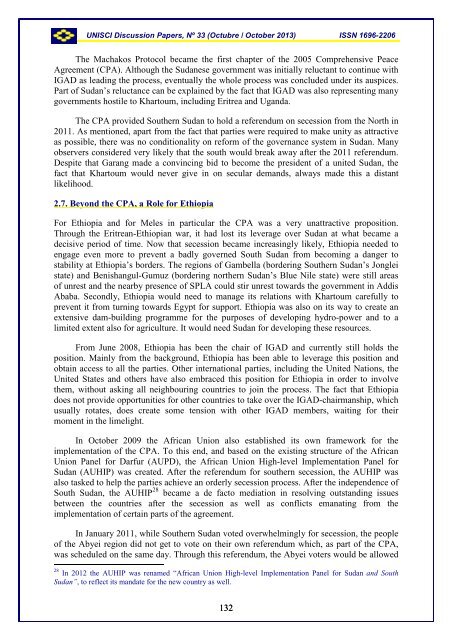UNISCI - Universidad Complutense de Madrid
UNISCI - Universidad Complutense de Madrid
UNISCI - Universidad Complutense de Madrid
You also want an ePaper? Increase the reach of your titles
YUMPU automatically turns print PDFs into web optimized ePapers that Google loves.
<strong>UNISCI</strong> Discussion Papers, Nº 33 (Octubre / October 2013) ISSN 1696-2206The Machakos Protocol became the first chapter of the 2005 Comprehensive PeaceAgreement (CPA). Although the Sudanese government was initially reluctant to continue withIGAD as leading the process, eventually the whole process was conclu<strong>de</strong>d un<strong>de</strong>r its auspices.Part of Sudan’s reluctance can be explained by the fact that IGAD was also representing manygovernments hostile to Khartoum, including Eritrea and Uganda.The CPA provi<strong>de</strong>d Southern Sudan to hold a referendum on secession from the North in2011. As mentioned, apart from the fact that parties were required to make unity as attractiveas possible, there was no conditionality on reform of the governance system in Sudan. Manyobservers consi<strong>de</strong>red very likely that the south would break away after the 2011 referendum.Despite that Garang ma<strong>de</strong> a convincing bid to become the presi<strong>de</strong>nt of a united Sudan, thefact that Khartoum would never give in on secular <strong>de</strong>mands, always ma<strong>de</strong> this a distantlikelihood.2.7. Beyond the CPA, a Role for EthiopiaFor Ethiopia and for Meles in particular the CPA was a very unattractive proposition.Through the Eritrean-Ethiopian war, it had lost its leverage over Sudan at what became a<strong>de</strong>cisive period of time. Now that secession became increasingly likely, Ethiopia nee<strong>de</strong>d toengage even more to prevent a badly governed South Sudan from becoming a danger tostability at Ethiopia’s bor<strong>de</strong>rs. The regions of Gambella (bor<strong>de</strong>ring Southern Sudan’s Jongleistate) and Benishangul-Gumuz (bor<strong>de</strong>ring northern Sudan’s Blue Nile state) were still areasof unrest and the nearby presence of SPLA could stir unrest towards the government in AddisAbaba. Secondly, Ethiopia would need to manage its relations with Khartoum carefully toprevent it from turning towards Egypt for support. Ethiopia was also on its way to create anextensive dam-building programme for the purposes of <strong>de</strong>veloping hydro-power and to alimited extent also for agriculture. It would need Sudan for <strong>de</strong>veloping these resources.From June 2008, Ethiopia has been the chair of IGAD and currently still holds theposition. Mainly from the background, Ethiopia has been able to leverage this position andobtain access to all the parties. Other international parties, including the United Nations, theUnited States and others have also embraced this position for Ethiopia in or<strong>de</strong>r to involvethem, without asking all neighbouring countries to join the process. The fact that Ethiopiadoes not provi<strong>de</strong> opportunities for other countries to take over the IGAD-chairmanship, whichusually rotates, does create some tension with other IGAD members, waiting for theirmoment in the limelight.In October 2009 the African Union also established its own framework for theimplementation of the CPA. To this end, and based on the existing structure of the AfricanUnion Panel for Darfur (AUPD), the African Union High-level Implementation Panel forSudan (AUHIP) was created. After the referendum for southern secession, the AUHIP wasalso tasked to help the parties achieve an or<strong>de</strong>rly secession process. After the in<strong>de</strong>pen<strong>de</strong>nce ofSouth Sudan, the AUHIP 28 became a <strong>de</strong> facto mediation in resolving outstanding issuesbetween the countries after the secession as well as conflicts emanating from theimplementation of certain parts of the agreement.In January 2011, while Southern Sudan voted overwhelmingly for secession, the peopleof the Abyei region did not get to vote on their own referendum which, as part of the CPA,was scheduled on the same day. Through this referendum, the Abyei voters would be allowed28 In 2012 the AUHIP was renamed “African Union High-level Implementation Panel for Sudan and SouthSudan”, to reflect its mandate for the new country as well.132
















